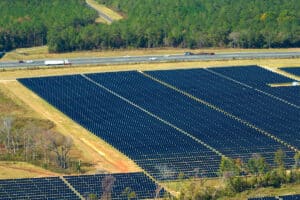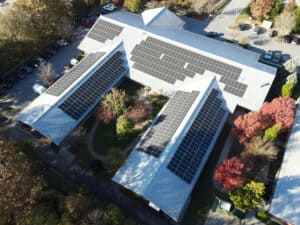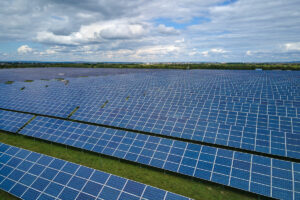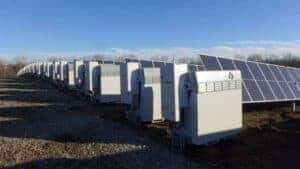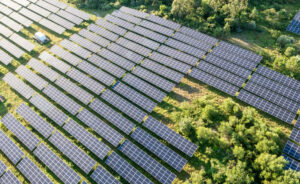Happy Women’s History Month! To celebrate, this month EnergyLink is having conversations with modern women in sustainability. For our fourth and final installment of Conversations with Women in Sustainability, Natalie Gregus sat down with Barbara Buffaloe, Columbia, Missouri’s first Sustainability Manager and current mayoral candidate. During their conversation, Natalie and Barbara covered topics like community sustainability and female representation in sustainability and politics. Click the link below to read last weeks installment of Conversations with Women in Sustainability. Keep reading for a verbatim transcript of the interview with Barbara Buffaloe.
Read Conversations with Women in Sustainability: Victoria La Rose
Verbatim transcript of Barbara Buffaloe interview below:
Natalie Gregus: Welcome to the fourth installment of EnergyLink Woman and sustainability conversations with modern industry leaders. This is taking place in honor of Women’s History Month. And my name is Natalie Gregus, I’m the Communications and Public Relations here at EnergyLink. Today I’m speaking with Barbara Buffaloe, who’s currently running for mayor, Columbia, Missouri. Before that she spent 11 years as Columbia’s first sustainability manager. So thanks for being with us today.
Barbara Buffaloe: Yeah, thank you for having me.
Natalie Gregus: To get started, can you tell us a little bit about yourself and your professional background?
Barbara Buffaloe: Yeah, yeah. So as you said, my name is Barbara Buffalo. And up until May of 2021, I had been this first sustainability manager for the city of Columbia, Missouri in their extension program.
So extension, land grant universities, have a mission to go out into all parts of the state to help take the information being researched at the university, and have localMissourians be able to embrace it. So I really love doing that I got to, I was also doing my graduate work at the same time for part of it.
So I got to research what make people seek out, like energy efficiency and conservation behaviors. And that’s where we found, you know, like, obviously, cost is ofan interest. And then comfort foods were interested in wanting to be comfortable at home. And the one thing that probably is what led me to work for the government was that people kind of just assumed that the government was going to require it or take, you know what I mean, just basically just do it. And so that was kind of like, a lot of my background to get me where I was.
Educationally, I’ve done my undergraduate and graduate work at the University of Missouri, thought I wanted to be an architect. And so I didn’t realize I was a good designer, but I was a better kind ofinfluencer, to get people to think about the role our built environment plays on creating communityand its impact on the planet. So yeah, this is like a quick little snapshot of where I come from.
Natalie Gregus: Yeah, awesome. I’m a Mizzou grad. So it’s always good to me another one. I definitely think that I was part of the population that kind of assumed, especially before working at EnergyLink, that the government was just kind of going to have all these things handled for us. And it’s really cool that you kind of set a precedent, of women’s leadership in the sustainability office and kind of add that up and running. So can you talk a little bit about some of the highlights from that part of your career, like your climate action and adoption plan? And any other highlights?
Barbara Buffaloe: Yeah, yeah. So um, you know, first it started off small, which is doing energy efficiency projects and cityfacilities. And I’ll tell you, you know, one of the feedback I heard recently from somebody was like, Well, gosh, I wish you had done more. But I think I kind of want to address like one of your leader questions. But when I started in my job, sustainability management offices
sustainability, these were not common, right, it was not a common vision or department within municipal governments. Whereas now you see, there’s a
Whereas now you see, there’s a lot more of them. So not only was I like starting up a new position, but I also was a young female entering it. So I was a 29 year old, you know, wife, I didn’t know at the time that I was also going to be a mom soon. And so I was that, and starting that in a very maledominated world, and local government is also it’s changing, which I’m thankful for. But it’s also a very traditional, you know, this is the way we’ve always done it. And this is why we’re going to continue doing it.
As a 29 year old woman joining that space, I was like, oh, gosh, okay. So, you know, part of my work was like, just trying to build those bridges. Yes, trying to show like, look, sustainability doesn’t have to be this crazy, out of left field idea. It can really just be common sense. That’s putting good governance into process and play.
We not only got to do energy efficiency improvements within the city of Columbia’s facilities, but we also then got to talk about how is our How is energy used in our city. So we participated in something called the Georgetown University energy prize, which ended up being like I felt like a pyramid scheme. It was really cool. You’re in competition to be a part of. But it was for college towns under certain population that wanted to kind of engage their community andthinking about how energy was used. So we, we did the research and the data to show how energy was used across the community.
We were able to show that in some of our pop in some of our neighborhoods, a smaller home was using more energy or had a higher energy use intensity than some of our older housing that might have been bigger. And so we’re able to kind of use that as an education piece, to communicate to people the importance of like building codes, and energy efficiency improvements. And then also like rebates and programs that are available from our localutility.
And so starting, we try to lead by example at the city and then do those community output programs. And then I would say the biggest one that you mentioned, is our climate action andadaptation plan, which was a two year process. It started first and 2017, where our mayor at the time, Mayor trees, said, okay, hold on, even though you know, President Trump is going to pull the United States out of the Paris Climate Accord.
We’re still in like a lot of other cities, we then took the call to action, and we set emission reductiongoals. And I was the staff leading the charge on creating the climate action adaptation plan, which had a task force, we had internal and external community groups, we had so many meetings, gosh, so many meetings, so many community events, online surveys, in person surveys, all this stuff to
develop, basically Colombia’s roadmap for how are we both going to prepare for an already changing climate? But also what can we do to reduce our own emissions so that we’re not contributing to global climate change.
Natalie Gregus: Yeah, and I think you mentioned education, I think that is so important in the realm of energy efficiency, especially because everyone thinks it’s going to be a huge, you know, non feasible thing, but it really doing small things can really add up. Yes. And so what does like community sustainabilitymean to you?
Barbara Buffaloe: So I think for me, it means that we’re thinking about, like, the needs of our current population, but not at the debt to future populations. Right, our future generations, you know, as I mentioned, you know, I’m a mom, I have two little buffaloes. And I think about you know, community sustainability is that I’m helping make a difference. So that my Columbia still around for them when their parents, and so I just community sustainability is working with your local, your local community, great nowmaking sure that the decisions you’re making are not harming them.
You’re thinking about, how are we having energy efficiency improvements? How are we thinking about how stormwater is organized? Or what do we do for trash and recycling? But that you’re doing it also with that, that vision for the future? So that you know, somebody else later on isn’t going to have to pay for it?
Natalie Gregus: Right? Yeah, I definitely think that’s super important mindset that we should all try to have in these times. But so what is your experience, and you kind of touched on this, but then like, as a female in this industry?
Barbara Buffaloe: It’s different. So sustainability, I think it’s a whole actually a very female dominated space. Because I can’t hop it assume it’s just because that’s kind of our skill set. Right, you have to be good at multitasking, because broadcast topic, and also you need to be like, more of, you know, caring and nurturing and thinking about the impacts locally and globally. So that’s just kind of already a female dominated space. But then when we talk about it in local government, local government, while we’re seeing a lot more female leadership, they’re still it’s still very much a white
male dominated environment.
And so you know, female, especially in sustainability, which can still be considered fringe in some parts, you have to work harder, you have to work harder to justify your existence. You need to work harder to build bridges with some of those traditional, you know,
existing structures and systems.
And then also being you have to also make sure you’re holding space for other voices, because while it is this male dominated space, um, I still have recognized my own lived experience is that a white woman, you know, who had parents who went to college and so I’m
already set up with a different lived experience, then online communities that are experiencing climate change, and just you know, social justice issues at a much strip, I guess, more strenuous place than than I did. And holding space for Those voices and making sure to consider the impacts of decisions made today on them right now, as well as in the future generations.
Natalie Gregus: Yeah, I think that perspective is also super important. And I commend you for that. And so kind ofwrapping up, like, if you have any advice, they’ve kind of touched on this, too. But any future female sustainability professionals? What would it be?
Barbara Buffaloe: I think building relationships and networks is key. Right. So becoming
involved in local groups that work in the space and like national groups, or international groups that work in this space. You know, there’s definitely ones that are for more, we met women focused. But then also just there’s usually like women, affinity groups within larger organizations. So as you’re,
you know, becoming involved in that those connections are going to be key, because that might be a future person who tells you about a job opportunity.
Or it’s a peer, like, I serve on the Board of Directors for the urban sustainability directors network. And it’s a peer network exchange, where you’re talking to other sustainability professionals in other cities, as a safe space, right to share, like, I’m struggling, I have these expectations and these goals for what we’re gonna do, and I’ve no idea how to get there. Yeah. And within a lot of those organizations, there’s then like affinity groups of, you know, you’re like others, they’re going through the same experiences as you that you can really like learn and grow together. So I really encourage that.
And then the other thing I would say is that in your local community, even getting involved with something that’s not necessarily in sustainability, like let’s say, the local Chamber of Commerce, Women’s Network, that’s another space for women empowerment, and like, so women supporting women. And so making those connections, then when you are coming out there, let’s say you’re with a company that’s proposing a huge solar field or something, right? You already have connections for champion people to champion for.
Natalie Gregus: Right, right. Yeah, I think that’s great advice. Community is definitely
important, not just in the sustainability field, but in any field. You mentioned.
Yeah. Yeah. Is there anything else you’d like to discuss?
Barbara Buffaloe: I think there’s one more thing, you know, last week, or two weeks ago, yeah,
two weeks ago, was International Women’s Day. And so we actually had an event for my campaign where it’s like, you know, women leaders through the years who came up in support of my campaign. And one of the things that was most interesting about this discussion was that, you know, women have been fighting for equal pay, and like, you know, working environments that are supportive of being, you know, a mother, a wife, or just a human.
I think it’s important to never, you know, don’t don’t forget that don’t forget that it hasn’t been that long before, you know, women had the right to vote. And like the fair, Fair Pay Act, you know, present in the 7060s, or 70s. Now, women still make less than men on average. So I encourage women to advocate for themselves. And, you know, if you’re a manager or you’re a hiring manager, whatever, to make sure that you’re advocating for equal pay and equal representation. So I think that’ll be key for our future.
Natalie Gregus: Yeah, that is also great advice. Well, thank you so much for your time today.
Really enjoyed speaking with you and make sure to check out all of our weekly woman sustainability conversations this month.
Barbara Buffaloe: Awesome. Well, thank you, Natalie. It was a pleasure.
Want to stay updated on EnergyLink’s Conversations with Women in Sustainability?
Click the button below to subscribe to our newsletter to stay updated on our weekly Conversations with Women in Sustainability! If you are interested in learning more about Barbara Buffaloe, follow her on LinkedIn or head to her website. This concludes our Women in Sustainability blog series. This Women’s History Month we are proud to honor not only Barbara Buffaloe, Victoria La Rose, Ariana Whitaker and Christina Lampert, but also all of the incredible women that came before them. Click the links below to read the series’ previous articles.
Read Conversations with Women in Sustainability: Ariana Whitaker
Read Conversations with Women in Sustainability: Christina Lampert
Read Women in Sustainability: 7 Historical Industry Leaders
If you are looking to increase sustainability at your business or organization click here to find out how you can get a project started. To speak with a team member directly dial (866) 218-0380.

